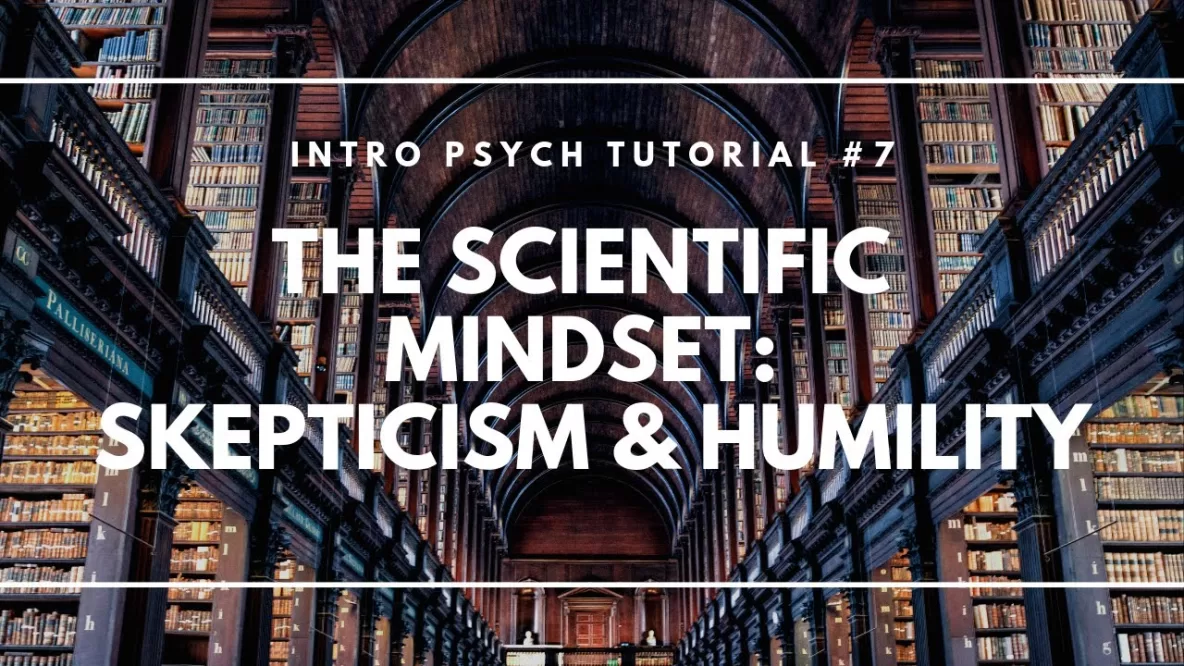In this video I discuss the role of skepticism and humility in thinking about scientific research and evaluating claims. I also mention the supposed “crisis of confidence” in psychology, the problem with pseudosciences, and the role that data plays in assessing accuracy.
Check out the James Randi Educational Foundation here: http://web.randi.org/
Don’t forget to subscribe to the channel to see future videos! Have questions or topics you’d like to see covered in a future video? Let me know by commenting or sending me an email!
Need more explanation? Check out my full psychology guide: Master Introductory Psychology: http://amzn.to/2eTqm5s
Viewers in China can find this video here: http://v.youku.com/v_show/id_XMTgzNzIxOTIzMg
Video transcript:
Hi I’m Michael Corayer and this is Psych Exam Review. In the last video I talked about some of the difficulties we face in conducting psychological research and in this video I’d like to talk about the mindset that we should try to have when it comes to thinking about scientific research
The first trait that we should try to have is skepticism by this I mean we should always question claims. We shouldn’t accept claims just because we like them or because we want them to be true, we need to have solid evidence.
This isn’t because we aren’t trusting; it’s because we know that the truth will survive our scrutiny but false claims will not.
I think the best way to practice this skeptical mindset is to think about extraordinary claims so if someone told you that they had psychic abilities or they could bend metal with their mind in this case you wouldn’t just accept their claim. You’d want to see some evidence and you’d probably be pretty demanding about what kind of evidence you’d accept. You’d want to make sure that you weren’t just seeing a magic trick.
That brings me to James Randi, magician and skeptic, who has offered a$1,000,000 prize for psychics whose abilities can meet the standards that Randi has set for scientific testing. And since he began offering the prize in 1964 no psychic has ever been able to claim it.
So we might be skeptical of these claims but we need to be equally skeptical of all claims especially any claims about psychological variables. In fact, you probably see these kind of claims on a daily basis. You read about strategies that are supposed to boost your happiness or things that will improve your sleep or enhance your cognitive abilities.
Well these claims need to be questioned as well. The questions we should ask, first: what are the claims? Specifically what’s being claimed here?
Secondly, who is making the claim? Is this coming from a neutral third party or is this coming from someone who’s trying to sell you a product?
Has this claim been tested? Is it even possible to test this claim? And if it hasn’t been tested how could you test it? How would we go about seeing if this claim held up?
And lastly, if there has been some testing and we do have some evidence how do we interpret that evidence? Does the evidence really support the conclusions that are being drawn?
So it’s important to have skepticism. It’s also important to have humility. This is our next trait. And this means a number of things.
The first thing it means is that we want to avoid overconfidence. This applies to new findings that we have that haven’t yet been fully tested, we don’t want to be too confident in these just yet. It also applies to older ideas. We don’t want to be overconfident that we know the things that we think we know. Perhaps they’re not actually true.
And along with that is this idea that we need to be open to critique. So even our oldest most cherished ideas are still subject to scrutiny and we need to be willing to accept criticism of those ideas. At the same time we need to be open to the new knowledge that might come from this.
If the evidence really supports some new idea then we need to be willing to embrace this new approach. Now recently people have talked about a “crisis of confidence” in psychology and this is because researchers have failed to replicate some old ideas and old theories that have long been a part of psychology but I don’t think this is a crisis at all. In fact this is exactly how science is supposed to work.We’re supposed to constantly be challenging those ideas, trying to come up with new, better approaches. So the fact that psychologists may be forced to come up with some new explanations and new interpretations makes me more confident than ever that were actually making progress in understanding human behavior.
Now in the video on phrenology I said that in a pseudoscience as you get more data you actually find your evidence becomes weaker and weaker and this is because a pseudoscience often starts with a mere coincidence and once you collect enough new data you realize that that’s all it was.
It was a coincidence and for this reason pseudosciences often resist testing. They’re afraid of new data because that data might show that they don’t actually have evidence supporting them. But if we want to have real scientific views then we need to be always open to new data. Because we know that more data is always better, assuming that data has been collected appropriately.
More data is going to serve to weak inaccurate views and it’s going to strengthen the views that are actually accurate.
In the next few videos I’m going to talk about how we try to ensure that the data we collect is actually good, accurate, objective data.
I hope you found this helpful, if so please like the video and subscribe to the channel for more.
Thanks for watching!

